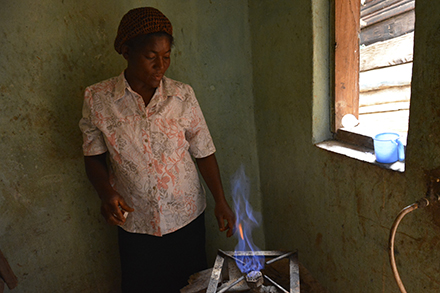It's hard to imagine, but 90 percent of the 59,000 people in the village of Bamendankwe in the North West region of Cameroon live below the poverty line. That same 90 percent depend on subsistence farming for their livelihoods and use wood as fuel for their home’s energy. Families are often forced to abandon their dreams due to financial hardship. One woman, Mbisirri Rose, faced these challenges as she grew up in poverty and was forced into marriage at 16 years old.
“My father had 25 children and was unable to educate us all because we were so poor,” Rose explains. “After obtaining my First School Leaving Certificate, my father gave me out in marriage as a teenager. Life seemed so unfair but I had no other option.”
Life became more difficult after Rose and her husband, Wanka William, began having children. William was a builder and Rose was a farmer, but their income was never enough to send their children to school. The family’s annual income stood at 450,000 FCFA, or about $900. Rose’s children faced chronic health issues because they just didn’t have enough money.
“I had little knowledge of raising animals or farming techniques and gardening,” Rose explained. “The food crops I cultivated were barely enough for daily consumption, and we had nothing extra to sell.”
After hearing of Heifer International Cameroon’s assistance to poor farming families like hers, Rose joined the Bamendankwe Unity Farming Group in 2007. Rose received training in dairy cattle husbandry, crop and vegetable farming, agroforesty, gender equity, and composting.
Rose also received Faith, her very own heifer. She received training on milk processing and developing dairy products, explaining that she “learned how to process the milk from Faith into yogurt, cheese and ice-cream.” Rose started selling her yogurt and other products to raise more money, and her family now consumes milk every day.
Heifer International Cameroon also introduced Rose to domestic biogas. By April 2012, Rose and her family constructed a biogas plant and were reaping the benefits. With their biogas plant and the new cattle, the family had enough manure and bio-slurry to use on their farm, thereby doubling their harvest.

“I now harvest 500 kilograms of Irish potatoes instead of just 200 each harvest. I’ve also tripled my bean production and doubled my corn production,” Rose says.
William also worked on the biogas project. “My husband was one of the first to be trained as a technician in the biogas project,” Rose explains. “He was the one who constructed our own biogas plant. We didn’t have to buy what it takes to have clean domestic energy at home since this technology uses cow manure, which we already have.”
Firmin Fula, Rose’s first daughter could barely hide her joy when biogas was first introduced to their family. “I used to suffer from the smoke generated burning wood,” She says. “With a functional biogas plant at home, I can get to school on time, clean the pots easier and I don’t have to worry about fetching wood and transporting it. That’s all in the past!”
Thanks to the introduction of dairy farming and biogas technology to her family, Rose quickly fulfilled her Passing on the Gift® commitment for her dairy cow and biogas, so another farmer can enjoy the same benefits. Rose has also encouraged her neighbors to construct their own biogas plants.
Rose’s family has now gone from an income of $900 to one of 2,000,000 FCFA, or $4,000 thanks to dairy farming and by selling surplus from their crops. Rose and William now operate a savings account, and have successfully paid for two of their children’s school registrations.
Heifer International Cameroon’s introduction of biogas has brought optimism and hope into numerous families like Rose’s. “My family has made immeasurable efforts for the sustainability of this project,” Rose says. “We work as a team and my family is not only healthy, but is now enjoying a new lease on life.”